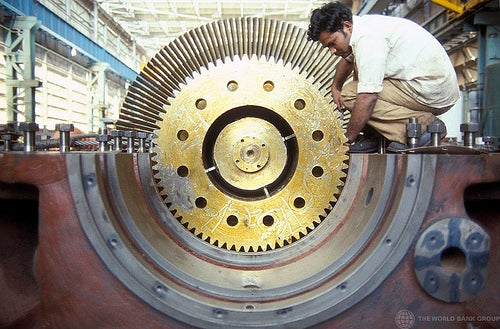
The value chain approach is in vogue for leading global firms and manufacturers (Credit: World Bank)
This is the first post in the “Supply Chain Junkie" series, which gives personal insights on supply chains- -the “new normal" of doing business that is currently being prioritized by IFC.
My debut in the fashion industry has not been easy, to say the least. I thought my ideas would speak for themself, but I’ve come to realize that I must significantly sharpen my design execution skills if I am to opt for a life in the fashion world. Through my journey into the ephemeral world of haute-couture and prêt-à-porter, I have come to know, understand and appreciate the brain behind the world’s leading fashion companies, including their business model, adaptive, expansionist and survival strategies and, of course, their logistics management practices. It was this very fascination with the fashion industry that made me eager to learn more about how lead fashion companies manage their products’ lifecycle and Value Chain (VC). I, thus, became more interested in the VC approach to doing business than ever. This might explain my excitement when my department at IFC decided to get into this terrain.
As for the IFC, this partnership will give the organization access to the global lead players who dominate about 80% of world trade. We will be able to capitalize on our already established VCs, helping them to improve and reform their identified VC pain points while simultaneously ensuring that VC governing structures are SME inclusive and sustainable, and not solely short-term and profit driven. We aim to help share benefits/rents with VC lead players- by reforming the chain governance rules and creating opportunities arising from the upgrade of certain VC segments.
Adopting such approach will not be easy. It’s not business as usual. The new VC approach will be a game changer; it will require more than just tweaking current offerings and fashionably dressing them up with a VC logo. We need a clear strategy to identify the type of VC in which to engage, as well as the countries and critical mass of assistance needed to sustainably and inclusively raise the role of LDC countries in global value chains. Of course, the IFC will need to tailor its strategy to each country as per its current position within the VC, the long-term commitment of the lead firm in the country, and the building blocks needed to make a difference. Subsequently, we will also need to link these factors up to regional or global VCs based on future demand and capacity.
With the ongoing consolidation of lead VCs (both activities and countries) due to the current economic situation, more countries are left out of the VC or left with few opportunities. IFC needs to make a move very soon to assist remaining countries with carving out a role within the world’s ever-changing economic dynamics.
As with the fashion industry, where you have to adapt very quickly in order to stay relevant, many countries need to quickly open up to new and different ways of doing things so as to compete within the global market where VC constitute its main nervous system. Hopefully, the IFC will be there when they do to help them add value to their own economy and society.
Value chains are not only fashionable, they are here to stay.


Join the Conversation